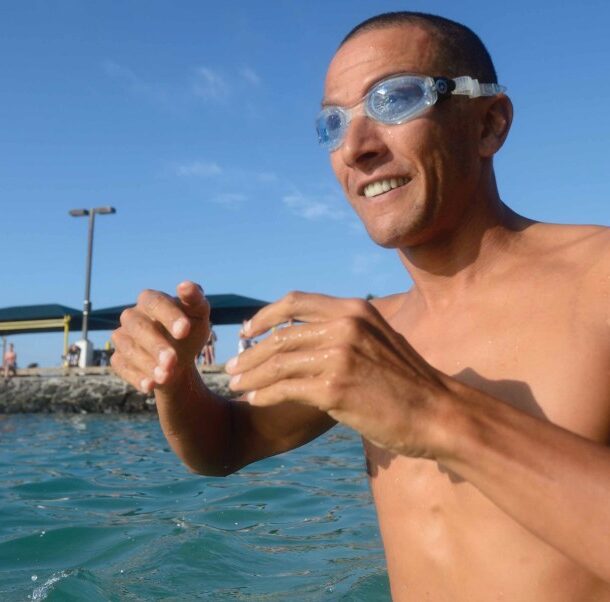
The elation is over, the fatigue has begun to settle and the endorphins have run their course. Macca’s four-step plan to staying positive.
(Originally published in Triathlete Magazine April 2013.)
Without a doubt, the most common feeling everyone has a few days after a big goal race is one of hollowness. The elation of the day is over, the fatigue has begun to settle and the endorphins have run their course. Everyone, professionals included, enter what is commonly referred to as “post-Ironman depression,” but it can stem from any event that has demanded a large amount of your time in preparation and planning, and then is finally over. The entire process is draining, and endurance racing rewards us with a painful yet fulfilling experience, an enormous release of endorphins, a physical post-event fatigue and then ultimately a feeling of “what now?”
What I hear most a week or so after a major race is “I just seem to have lost my motivation.” Many people attach guilt to this feeling. It is absolutely normal to feel this way. There has not been a major event in my career, whether I have won or lost, when I have felt like diving immediately back into hard training. I find if I force the work, I really struggle with my motivation around week three. It is imperative that you understand that motivation is a drive that requires nurturing, and if you neglect it with inadequate rest, it is very easy to get completely derailed.
I have found that the best thing to do after any major race is to take some downtime. Your “A” race is an event that has demanded a big portion of your attention. This mental strain accumulates and can be a heavy burden that you don’t even realize you have carried. Our desire and focus to achieve goals can leave us oblivious to much of the fatigue that the body hides under stress. The natural, accumulated physical fatigue plays a part, but I also attach the transition from a huge endorphin release to a return to normalcy as a precursor to this natural post-race low.
Sometimes, lack of motivation is a healthy, telling sign. It’s your body’s way of saying, “That goal demanded a lot of me.” You should use this as an opportunity to reconnect in other areas of your life.
The worst thing you can do is dive back into any structured training too quickly. When people are emotionally driven trainers this can be very difficult. When the race doesn’t go as planned, they immediately dive back into hard work to rectify the problem. Don’t make this mistake.
Or maybe your race went to perfection, and you feel like you can conquer the world and dive right back into training—also not good. It is essential you take time to absorb, then rest, recharge and reset before building again so you can conquer your next goals.
Here’s my post-race approach:
Rest
I start any post-Ironman week by just chilling out. After a week I may jump on the bike with friends, but my physical exertion is limited and always only done in a social environment. I choose low-impact workouts with no structure. If I want to ride an hour, I do. If I feel OK and go three hours, then so be it.
The key here is that I attach no guilt to my first eight days. I allow my “mojo” to find me again—I don’t look for it. This is the key. Depending on the event’s distance, I take up to two weeks.
Recharge
After about eight days you need to start to stimulate yourself mentally. It is here that I start to talk about future races. I will start the planning process of building my training program, and begin engaging my family and team on the path I will take to do that. I find that once I start to focus on planning again, the motivation and the desire starts to grow again.
Typically after a two-week window I find a bit of drive again. This is the time to reintroduce some structure, but I still keep the workload to about 60 percent of what I was doing before my “A” race. The key is to slowly, methodically build out training sessions around your re-energized mind-set.
Reset
After about 28 days, I am usually back into a fully structured training routine and am feeling motivated. I allowed myself the physical time to recover—but more so, I gave myself the mental break. If you give yourself that time, and change that self-obsessed, quantitative-driven mind-set that got you to the start line in the first place, the build back into training is an easy one—and the next block of work will be even stronger and better than the last. Goals are dreams with a plan, and when we stop setting them, we stop moving forward.
The Four-Step Plan
Rest
1–2 weeks after race
Chill out, with the option of working out only if you feel like it (café ride, anyone?). No guilt allowed!
Recharge
3–4 weeks after race
Start mentally planning future races. Introduce a bit of structure, around 60 percent of the workload you were doing prior to your “A” race.
Reset
4–6 weeks after race
Get back into a structured training routine and decide on your next goal.
Rebuild
6 weeks or more
Continue driving toward the next race by tackling training with renewed motivation and health.
Philosophy
“Great things happen to people who make great things happen.”
Navigate
chris@macca.com
Terms & Conditions
Privacy Policy

